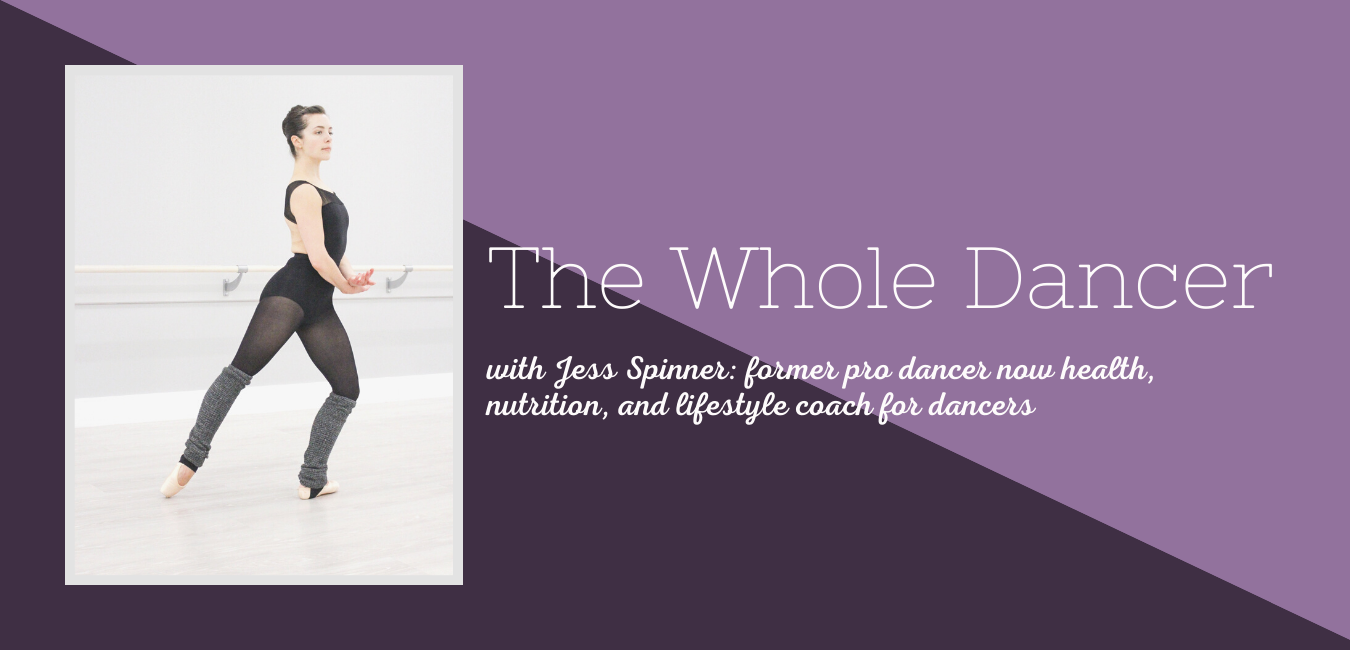A topic dancers bring up with me quite frequently in coaching sessions is concern about bloating. It’s relatively unavoidable, and it doesn’t have to dominate your thoughts when you’re in front of the mirror.
Part of the solution is how you think about bloating, which can improve your relationship to your body and bloating. There are also practical shifts you can make like how you approach food, meal timing, and habits that can actually reduce bloating and help you find more comfort in your body.

What is bloating?
Bloating is when your stomach feels full and tight, often due to gas. Many dancers experience bloating. When you’re at a lower body weight, which is also relatively common in ballet, the experience or appearance of bloating can be exacerbated.
What causes bloating?
The most common assumption is that bloating is always caused by certain foods or food intolerances. While this certainly can be the case, it isn’t always.
Some of the more commonly known causes of bloating include:
- Food intolerances or allergies
- Not getting enough whole grains and fiber
- Poor hydration: drinking more water helps remedy bloating
- Consuming lots of gum or carbonated beverages: swallowing more air leads to bloating
Less commonly acknowledged causes of bloating
Not eating enough or not eating consistently.
Dancer schedules are busy and irregular, which can make it challenging to eat regularly. It’s beneficial to eat every 2–4 hours and not let more than 5 hours pass between eating. Eating too quickly or too close to intense movement can cause bloating.
Eating slowly, chewing food thoroughly, and finding more presence when you are eating can help reduce bloating. Making sure you’re eating enough is also essential.
Chronic restriction can cause the muscles of your stomach and intestines to weaken from underuse. This leads to sluggish digestion and bloating. A dancer who stops eating consistently, gets into the habit of restrictive eating and then overeating, or who experiences an eating disorder can experience more bloating.
Constipation can also be a culprit in bloating, and one of the causes of constipation is simply not eating enough.
Stress in your life and/or dance environment.
When you’re stressed, it puts your body into fight-or-flight mode, which inhibits digestion. The opposite of this is rest-and-digest, which aids in digestion. In times of stress, blood is redirected away from your stomach and digestive system and instead flows to your muscles.
Your mental state and digestion are deeply connected. There’s two-way communication between your brain and digestive system—often called the gut-brain axis—which involves your nervous system, hormones, gut microbiome, and immune function. Feeling nervous before class, rehearsals, or auditions can impact this communication system, leaving you feeling bloated with sluggish digestion.
Hormonal changes.
Some hormonal fluctuations are normal and to be expected as you see cyclical hormonal changes associated with your menstrual cycle. Bloating in the days or week leading up to and during your period is quite normal. Food choices and overall approach to nutrition and food timing can impact the severity of bloating during this time.
There are also hormonal changes associated with stress. When you’re stressed, your body produces more cortisol and adrenaline, which increase gastric acid production and leads to heartburn, indigestion, and bloating.
Dairy consumption.
The older you get, the less lactase you produce. This is the digestive enzyme that breaks down lactose (the sugar in milk). Without being able to properly digest dairy, you’re likely to experience gas and bloating.
What you can do about bloating in ballet
Movement and bloating.
While you are already incredibly active with your dancing, calm movement around eating can help you digest your food more efficiently. Gentle movement like yoga, walking, or stretching can aid in digestion and reduce bloating. Even light walking after meals can help support digestion and reduce the chance of bloating.
Supplements for support.
You might explore digestive enzymes or soothing options like peppermint or ginger tea to aid your body’s digestive processes. While these should never be relied on as quick-fix options, they may provide temporary relief in times of need.
Your mindset around bloating in ballet.
As you can see, some bloating is unavoidable. My hope is that by understanding all of these less common causes of bloating, you can be less self-critical when it happens. Do what you can to find clarity with what might be causing your bloating. It might be worth seeing a gastroenterologist who is equipped to diagnose more serious causes of bloating like celiac disease or gastritis.
For normal levels of bloating, it’s important to come to a point where you accept it as a part of life. Wear the leotards that make you most comfortable on those days. If you’re allowed to wear some sort of warm-ups that increase your comfort level, do it.
When you see yourself in the mirror, check in with yourself mentally. If you’re fixating on the bloating and your stomach, shift your focus to your dancing. Remind yourself what’s going well in your dancing. Try literally bringing your focus upward—shift your attention to your port de bras, your artistry, your intention.
You’re not alone.
So many dancers bring up bloating as a concern. When we discuss it in coaching sessions, finding possible culprits and identifying ways to cope or mitigate some of the bloating causes is incredibly productive because bloating is something the majority of dancers experience at some point.
If you’re looking for support to find an easy, effective, and personalized approach to food, book a coaching consultation to see if health, nutrition, and lifestyle coaching is the right fit for your needs.
Bloating doesn’t define you or your dancing. With awareness, self-compassion, and some strategic shifts, you can build a healthier and more relaxed relationship with your body—even on the bloated days.
